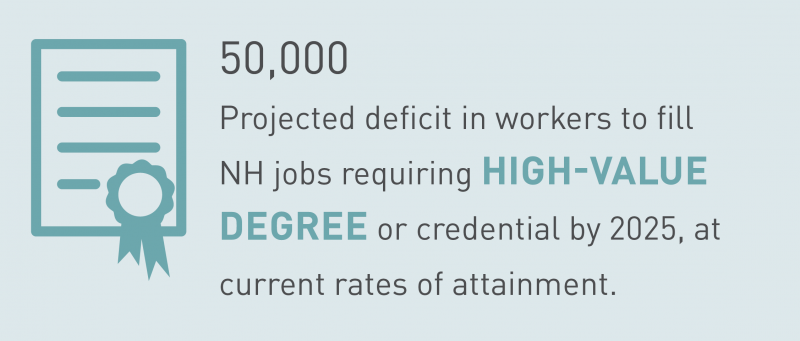Education and Career Pathways
Aleah Douglas (third from left) of Rochester had half her associate degree finished when she graduated Spaulding High School, thanks to a partnership between the high school and Great Bay Community College.
GOAL: All kids get the education and training they need to thrive in the workplace
Why it matters
Aleiah Douglas will graduate high school with her associate degree halfway finished and a certificate in advanced composites manufacturing. She will walk in her cap and gown on a Friday, and, on the following Monday, be able to step into a job making $19 an hour, with advancement opportunities and benefits, including tuition reimbursement to finish college.
Aleiah is one of 13 students in a pilot program in Rochester that gives young people the opportunity to train for careers in a high-demand field in New Hampshire — without running up any college debt.
The program — a partnership between Spaulding High School, Great Bay Community College and Safran Aerospace Composites — has equipped a lab at GBCC and guaranteed each student a job interview. The curriculum includes significant lab time spent operating the same equipment that employees use at Safran. Students split their time between high school and college for their senior year. The program is free for participants.
The Foundation helped launch this and other pathways throughout the state to help students get the education they need — and help build the workforce of tomorrow.
Current demographic trends underscore the importance of these efforts: New Hampshire’s workforce is aging, with a large demographic bubble moving into retirement. New Hampshire is seeing a downward trend in the number of high school graduates.
Forty-eight percent of graduating high school seniors go to college out-of-state — and many do not return (the number is even higher for students going to four-year colleges — 60 percent of those students leave New Hampshire). Unemployment in the state is low, with scores of jobs going unfilled in the advanced manufacturing, health care and high-tech sectors.

More than ever, our kids need help to afford higher education and training. Decades of tuition inflation coupled with low rates of state investment and stagnated federal aid mean New Hampshire students bear the highest debt load in the nation. Tomorrow’s teachers, business people, historians, musicians, engineers, doctors and nurses, plumbers and firefighters all need help to get the education they need to get good jobs in New Hampshire. Generous New Hampshire citizens who have created scholarship funds make it possible for the Foundation to award more than $6 million to New Hampshire students each year.
Together, we can help New Hampshire’s kids get the education they need to become thriving adults who will sustain New Hampshire’s communities and economy. And we can help make sure that all of our kids have the opportunity to become adults who sustain and strengthen New Hampshire communities tomorrow.
Strategies and progress to increase opportunity
The Foundation is providing scholarships to students in need; aligning student aid with New Hampshire’s workforce needs and best-paying careers, including those requiring certificates and two-year degrees; investing in effective pathways to work, including dual-enrollment programs and apprenticeships; advancing “65×25,” the state’s goal of 65 percent of New Hampshire adults having postsecondary degrees or credentials by 2025.
Significant progress has been made, including:
- The Foundation helped build new “pathways to work” including supporting a new computer programming track in Portsmouth and funding efforts in Milford, Keene, Langdon and Gorham.
- The Foundation and the Business and Industry Association launched “Workforce Accelerator 2025,” an effort to support partnerships between New Hampshire’s schools and businesses to strengthen school-to-career pathways.
- Foundation scholarships to students attending community colleges have tripled, and we’re committing $500,000 a year in scholarships to community college students through 2022.
- We have partnered with the Eastern Bank Charitable Foundation to provide an additional $250,000 in scholarships for professional training, certificate and two-year degree programs for New Americans and other students in need.
- We created the Pathways 2025 Fund with an initial $250,000 for grants to advance leadership, collaboration and innovation to achieve 65 by 25 with an emphasis on increased equity and social mobility for young people and families.
- With donor support, the Foundation made a $150,000 grant to Duet, a nonprofit organization that helps adult learners in the greaterManchester area to earn college degrees in high-demand fields through Southern New Hampshire University’s College for America.
We're here to help
To learn more about ways to help New Hampshire's kids thrive, contact:

- Michael Turmelle
- Director of Education and Career Initiatives
 603-225-6641 ext 147
603-225-6641 ext 147 Email Michael
Email Michael


